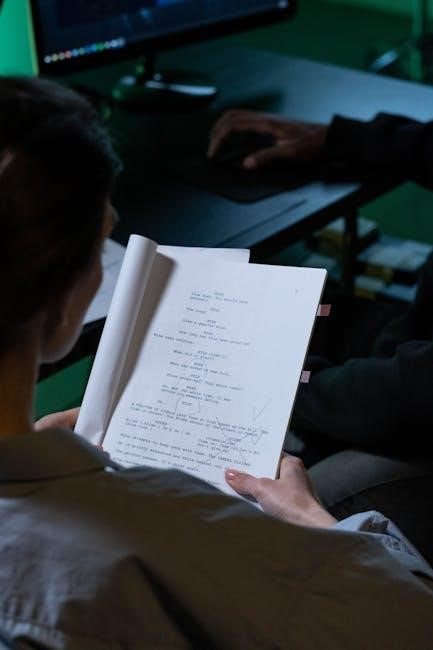
The Diary of Anne Frank Play Script: A Comprehensive Guide
Embark on a journey to understand the profound impact of “The Diary of Anne Frank” through comprehensive play scripts. These resources offer invaluable insights into the story‚ characters‚ and historical context‚ available in convenient PDF format.
Availability of PDF Scripts
Finding a PDF version of “The Diary of Anne Frank” play script is relatively easy‚ given its widespread popularity and educational significance. Numerous websites offer downloadable scripts‚ often catering to schools‚ theater groups‚ and individuals interested in studying or performing the play. These online resources provide a convenient way to access the script‚ allowing for easy reading‚ printing‚ and annotation.
It’s essential to ensure the legitimacy and quality of the PDF before downloading. Look for reputable sources such as educational institutions‚ established theater companies‚ or authorized publishers. These sources are more likely to provide accurate and complete versions of the script‚ free from errors or unauthorized alterations. Be cautious of websites offering free downloads from unknown sources‚ as they may contain incomplete or inaccurate scripts‚ or even malware.
Many online platforms also offer previews or excerpts of the script‚ allowing you to review the content before committing to a full download. This can be particularly helpful if you are looking for a specific adaptation or version of the play. Always prioritize downloading from trusted sources to ensure you have a reliable and accurate script.
Sources for Free Downloads
Discovering free downloads of “The Diary of Anne Frank” play script requires careful navigation. Educational websites‚ particularly those of high schools and universities‚ sometimes offer scripts for academic purposes. These resources are often reliable and provide accurate versions of the play. Theater companies‚ both amateur and professional‚ occasionally share scripts or excerpts on their websites as promotional material or for educational outreach.
Online archives and digital libraries‚ such as those dedicated to dramatic literature‚ can also be valuable sources for finding free PDF scripts; These platforms often host a variety of plays and theatrical works‚ including adaptations of “The Diary of Anne Frank.” However‚ it’s essential to verify the authenticity and completeness of any script downloaded from these sources.
While some websites may offer seemingly free downloads‚ be wary of potential copyright infringements or hidden costs. Always check the terms of use and licensing agreements before downloading any script. Prioritize reputable sources and ensure that the script is properly attributed to the playwrights and copyright holders. By exercising caution and diligence‚ you can find legitimate and free resources for studying or performing “The Diary of Anne Frank.”
Legality of Downloading Scripts
Understanding the legality of downloading play scripts‚ especially “The Diary of Anne Frank‚” is crucial to avoid copyright infringement. Play scripts are protected by copyright laws‚ which grant exclusive rights to the playwrights and their representatives. Downloading a script without permission or proper licensing constitutes a violation of these rights. Unauthorized distribution or reproduction of copyrighted material can lead to legal consequences‚ including fines and potential lawsuits.
Many websites offer free downloads‚ but it’s essential to verify the legitimacy of these sources. Scripts found on unofficial or questionable websites may be pirated or unauthorized copies. To ensure compliance with copyright laws‚ obtain scripts from reputable publishers‚ authorized distributors‚ or licensing agencies. These sources provide legal access to scripts and ensure that playwrights receive proper compensation for their work.
If you’re unsure about the legality of a particular download‚ consult with a legal professional or contact the copyright holder for clarification. Respecting copyright laws not only protects the rights of playwrights but also fosters a culture of creativity and artistic integrity within the theater community.

Understanding the Play’s Structure
Delve into the structural intricacies of “The Diary of Anne Frank” play. Explore how the narrative unfolds through acts and scenes‚ creating a powerful theatrical experience that mirrors Anne’s compelling story.
Act I Overview
Act I of “The Diary of Anne Frank” introduces us to the setting: the secret annex in Amsterdam. We meet the Frank family‚ the Van Daans‚ and Mr. Dussel as they begin their lives in hiding from the Nazis. The act establishes the initial relationships and the challenges of confinement.
Anne’s vibrant personality shines through as she navigates the difficulties of sharing a small space with others. The audience witnesses the early stages of fear‚ hope‚ and the struggle to maintain normalcy amidst extraordinary circumstances. Key themes of identity and family are explored.
The act concludes with a sense of growing tension and the ever-present threat of discovery. The audience is left with a poignant understanding of the sacrifices made and the resilience required to survive in such dire conditions. Anne’s diary becomes a central element.
Act II Overview
Act II delves deeper into the interpersonal conflicts and the psychological toll of prolonged confinement. As time passes‚ tensions rise within the annex‚ testing the relationships between the families. The characters grapple with dwindling resources‚ increasing fear‚ and the emotional strain of their situation.
Anne’s character continues to evolve as she confronts her own identity and the realities of her circumstances. The act explores themes of hope‚ despair‚ and the loss of innocence; The audience witnesses the growing bond between Anne and Peter‚ offering a glimpse of youthful connection.
The climax of Act II brings the devastating news of their discovery and capture. The act concludes with a sense of profound loss and the tragic realization of their fate. The audience is left with a lasting impression of the human cost of intolerance.

Key Themes and Adaptations
Explore the enduring themes of hope‚ resilience‚ and the challenges of adapting a personal diary to a theatrical play. Discover the different versions that highlight the story’s impact and historical relevance.
The Power of Hope
The play adaptation of “The Diary of Anne Frank” showcases the unwavering power of hope amidst unimaginable adversity. Anne’s diary entries‚ transformed into dialogue and scenes‚ reveal her optimistic spirit despite the grim realities of hiding from the Nazis. This hope fuels her dreams for the future and her belief in the inherent goodness of humanity‚ even as the world around her crumbles.
The play effectively conveys how hope becomes a lifeline for Anne and her companions‚ sustaining them through fear‚ confinement‚ and uncertainty. It highlights the contrast between their bleak situation and Anne’s vibrant imagination and unwavering belief in a better tomorrow. This theme is particularly poignant‚ reminding audiences of the resilience of the human spirit in the face of oppression and the importance of cherishing hope even in the darkest of times.
Challenges of Adaptation from Diary to Play
Adapting “The Diary of Anne Frank” into a play presents unique artistic and narrative challenges. The diary’s intimate‚ introspective nature‚ primarily conveyed through Anne’s personal thoughts and reflections‚ must be transformed into dynamic‚ engaging dialogue suitable for the stage. This requires carefully selecting and dramatizing key events and emotions while preserving the authenticity of Anne’s voice.
Another challenge lies in condensing the extensive timeline and numerous diary entries into a manageable theatrical length. The playwrights must make strategic choices about which aspects of Anne’s experience to emphasize‚ balancing historical accuracy with dramatic impact. Additionally‚ the play must visually represent the claustrophobic and emotionally charged environment of the Secret Annex‚ relying on set design‚ lighting‚ and sound to create a compelling and immersive experience for the audience.
Different Versions of the Script
Over the years‚ “The Diary of Anne Frank” has been adapted into various stage versions‚ each offering a unique interpretation of Anne’s story. The original adaptation by Frances Goodrich and Albert Hackett‚ which premiered in 1955‚ is a classic and widely performed version. However‚ Wendy Kesselman’s revised adaptation‚ commissioned in 1997‚ offers a more contemporary and nuanced perspective.
Kesselman’s version incorporates previously omitted passages from the diary‚ providing a more comprehensive and historically accurate portrayal of Anne’s experiences. It delves deeper into the complexities of the characters and explores themes of identity‚ prejudice‚ and resilience with greater sensitivity. Furthermore‚ other adaptations may exist for specific audiences‚ such as school productions or simplified versions for younger viewers.

Analyzing the Characters
Delve into the intricate personalities of Anne Frank‚ Otto Frank‚ the Van Daans‚ and Mr. Dussel. Understand their motivations‚ relationships‚ and character arcs within the play’s confined setting‚ revealing their humanity.
Anne Frank’s Character Development
Explore Anne Frank’s transformation from a spirited‚ playful teenager into a reflective‚ insightful young woman. The play script vividly portrays her emotional growth amidst the oppressive atmosphere of hiding. Witness her initial optimism gradually evolve as she grapples with the harsh realities of war and confinement.
Analyze her diary entries adapted for the stage‚ revealing her inner thoughts‚ fears‚ and hopes. Observe how her relationships with her family and Peter van Daan shape her understanding of love‚ loss‚ and identity. Her resilience and unwavering belief in humanity are central to the play’s message.
Trace her journey from youthful exuberance to profound maturity‚ showcasing her remarkable capacity for self-reflection and empathy. The play emphasizes her evolving perspective on the world‚ her dreams for the future‚ and her enduring spirit in the face of adversity.
Otto Frank’s Role
Delve into the pivotal role of Otto Frank‚ Anne’s father‚ as the anchor of the family and the play’s narrator. His strength and quiet dignity provide a stark contrast to the surrounding chaos and fear. Explore how he guides and protects his family‚ offering them hope and stability in their confined existence.
Examine his unwavering optimism and his efforts to maintain a sense of normalcy within the Secret Annex. His gentle nature and wise counsel influence Anne’s character development‚ fostering her intellectual curiosity and moral compass. He embodies resilience and serves as a symbol of hope amidst despair.
Analyze his post-war journey as he grapples with the loss of his family and his decision to publish Anne’s diary. His dedication to sharing her story ensures her voice endures‚ transforming her personal experiences into a universal message of tolerance‚ understanding‚ and the importance of remembering the Holocaust.
The Van Daans and Mr. Dussel
Explore the complex dynamics introduced by the Van Daans and Mr. Dussel within the Secret Annex. These characters represent contrasting personalities and coping mechanisms under immense pressure. Analyze how their interactions contribute to the rising tensions and conflicts in the confined space‚ revealing the darker aspects of human nature.
Examine the Van Daans’ materialism and selfishness‚ which clash with the Franks’ idealism and generosity. Their constant bickering and petty squabbles highlight the challenges of forced cohabitation. Investigate Mr. Dussel’s self-centeredness and his difficulty adjusting to the already strained living situation‚ adding further strain to the group’s dynamics.
Consider how these characters function as foils to the Frank family‚ emphasizing the importance of empathy‚ compassion‚ and selflessness in the face of adversity. Their flaws and imperfections humanize the story‚ reminding us of the complexities of human behavior during times of crisis and the challenges of maintaining hope.

Educational Resources and Study Guides
Unlock the educational potential of “The Diary of Anne Frank” with curated study guides and resources. These tools provide valuable context‚ analysis‚ and activities for students and educators alike‚ promoting deeper understanding.
Study Guides for Students
Dive into “The Diary of Anne Frank” with meticulously crafted study guides designed specifically for students. These resources offer a comprehensive approach to understanding the play’s complex themes‚ historical context‚ and character development.
Engage with thought-provoking questions that encourage critical thinking and analysis of Anne’s experiences and the challenges faced by those in hiding. Explore the play’s symbolism and literary devices‚ gaining a deeper appreciation for its artistic merit.
Benefit from detailed character analyses‚ plot summaries‚ and scene breakdowns‚ providing a clear and concise overview of the narrative. Enhance your comprehension with vocabulary lists and definitions‚ ensuring a thorough understanding of the language used in the play.
Utilize these study guides to prepare for class discussions‚ essays‚ and exams‚ mastering the key concepts and themes of “The Diary of Anne Frank.” These resources empower students to connect with the play on a personal level‚ fostering empathy and understanding.
Teacher Resources and Lesson Plans
Empower your students with comprehensive teacher resources and engaging lesson plans designed to explore “The Diary of Anne Frank.” These materials provide educators with a wealth of tools to facilitate meaningful discussions and activities in the classroom.
Access detailed lesson plans that align with curriculum standards‚ covering key themes such as prejudice‚ tolerance‚ and the importance of hope in the face of adversity. Utilize interactive activities and group projects to encourage student participation and critical thinking.
Explore a variety of teaching strategies‚ including role-playing‚ debates‚ and creative writing assignments‚ to cater to diverse learning styles. Enhance your lessons with primary source materials‚ such as historical documents and photographs‚ to provide a deeper understanding of the Holocaust.
Benefit from assessment tools‚ including quizzes and essay prompts‚ to gauge student comprehension and mastery of the material. These resources equip teachers with the necessary tools to create a powerful and impactful learning experience for their students‚ fostering empathy and historical awareness.
Leave a Reply
You must be logged in to post a comment.